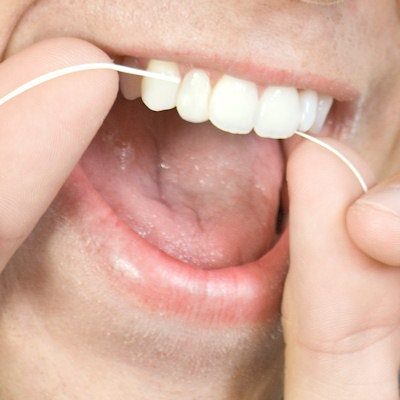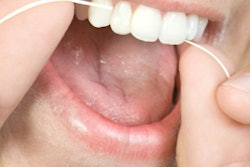
In the next days and weeks, dentists are likely to hear one question over and over again from patients: "Do I still need to floss?" But dental groups continue to support flossing in the wake of a critical report that questions the evidence backing the practice.
In an August 2 report, the Associated Press (AP) cast into question the clinical evidence supporting the practice of flossing. The widely reported AP article examined 25 peer-reviewed studies on the effectiveness of flossing and found weak or unreliable evidence that flossing had long-term benefits.
But the ADA and the American Academy of Periodontology (AAP) have fired back, maintaining that the use of "interdental cleaners," such as floss, is an "essential" part of periodontal care.
Questionable evidence?
The AP report reviewed the clinical literature on flossing and focused on studies that compared the use of a toothbrush to the combination of a toothbrush and floss. Twenty-five studies were included. The evidence for flossing was "weak, very unreliable" and "very low" quality, as well as carries "a moderate to large potential for bias," according to the AP report.
The article quoted from two 2015 reviews.
"The majority of available studies fail to demonstrate that flossing is generally effective in plaque removal," one review noted. The other found "inconsistent/weak evidence" for flossing and a "lack of efficacy."
The AP story claims that its investigation may have already had an impact on public policy. After the AP asked federal agencies for evidence to back its recommendation of flossing, the U.S. Department of Health and Human Services subsequently removed flossing from its 2015-2020 Dietary Guidelines, while acknowledging that flossing's effectiveness had never been researched.
Firing back
The American Academy of Periodontology, whose president was interviewed in the AP story, issued an August 2 release defending the practice of flossing while seeming to concede the need for more studies.
"The American Academy of Periodontology recommends daily flossing as one part of a regular oral hygiene routine, which also includes brushing your teeth twice a day and ensuring you receive a comprehensive periodontal evaluation every year," the AAP stated.
Flossing allows for the removal of plaque bacteria beneath the gumline and debris from areas that a toothbrush cannot reach, the academy noted.
However, the AAP acknowledged that the development of periodontal disease takes place over a period of time and is influenced by multiple factors. The academy recommended that studies that examine the efficacy of daily flossing be conducted "over a number of years and among a large population."
“In the absence of quality research, patients should continue to include flossing as a part of their daily oral hygiene habit.”
The academy also acknowledged the weakness of the current literature.
"Much of the current evidence does not utilize a large sample size or examine gum health over a significant amount of time," the AAP stated. "Additionally, many of the existing studies do not measure true markers of periodontal health such as inflammation or clinical attachment loss."
However, the academy concluded its release supporting the practice of flossing.
"In the absence of quality research, patients should continue to include flossing as a part of their daily oral hygiene habit," the AAP stated.
The ADA also issued a release, focusing on proper technique rather than scientific evidence.
"Whether you use floss or another interdental cleaner is a personal preference, but it's very important to understand the proper technique for each tool so that it is effective. Patients should talk to their dentists about how to use interdental cleaners to ensure efficacy," the ADA stated.
Manufacturers of water flossing products quickly issued statements on what they called string flossing.
Deborah Lyle, RDH, the director of professional and clinical affairs at Water Pik, stated in a release that the AP article confirmed what her company has said for years, while also noting that it's crucial to clean between teeth.
"The unequivocal recommendation of string floss is not scientifically based," she noted. "However, the announcement did not say you do not have to clean between your teeth. As a clinician and researcher, I have found that a water flosser was better for my patients than string floss, and they have been proven more effective in several clinical studies."
Sealing manufacturer approval
The AP article also highlighted the process the ADA undertakes to grant its Seal of Acceptance. Each manufacturer is charged $14,500 for an evaluation of a product, according to the article. There is an annual fee of $3,500 if the association grants its seal.
The ADA claimed it does not profit from the evaluation or the program, but manufacturers, not the ADA, design the studies.
Marcelo Araujo, DDS, PhD, vice president of the ADA's Science Institute and who used to work for Johnson & Johnson, confirmed these points in the AP article.
"The funding can come from companies -- no problem at all," Dr. Araujo stated. "The design can start from the company."
Standards of science
Timothy Iafolla, DMD, MPH, noted in the AP article that it would be appropriate to drop the floss guidelines if the highest standards of science were applied. Dr. Iafolla is a public health analyst at the National Institutes of Health Office of Science Policy.
However, he said flossing was still worthwhile.
"It's low-risk, low-cost," Dr. Iafolla said. "We know there's a possibility that it works, so we feel comfortable telling people to go ahead and do it."



















